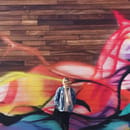Edited by Sophia Savva
Bridges: that is what Jusoor means in Arabic.
I think it’s a pretty fitting name, considering the work this organization does,
A nonprofit organization of passionate and hardworking Syrian expatriates, Jusoor strives to support youth achieve their full potential through programs including career development, scholarships and global community engagement.
They act as a bridge between two experiences for the Syrian refugee.
However, their work is not confined to one country; they try to be as supportive as they can to Syrians who have moved away from home due to the terrible, ongoing crisis in Syria.
Though this NGO is relatively young, they have an inspired and positive leadership heading them in the right direction. Their tone is all about hope–that, yes, there are atrocities being carried out in their home country, but can still come together and try to raise awareness, change the path of someone’s life and give Syrians opportunities that they deserve but don’t have access to because of the violence and war.
I learnt this and so much more at Jusoor’s Fifth Annual Global Conference, which was held at Rotman Commerce School of Management on the October 14.
The conference focused on three main themes: social integration and inclusion through higher education opportunities, opportunities and challenges to economic integration and presenting thriving social integration solutions. The panelists who spoke on key topics came from all backgrounds and walks of life, but they all had similar beliefs when it came to how education plays a vital role in the social integration of a refugee.
I took away a few things from this conference and I wanted to highlight what they were. The first was how university is not the only path to higher education. All my life, I was brought up in a surrounding where it was basically a given that after secondary school, you go to university and earn a degree. But when it comes to helping refugees who are scrambling to get away from war-torn countries, it is important to realize that a university degree is not the only way they can be successful. Community college, internships and training programs are just a few of the many alternatives we, as a global community, should think about when it comes to assisting refugees.
Another key point that I took away is the concept of ‘disruptive’ being a positive thing.
Usually when we hear this word, we think about it in a negative way. But many of the panelists spoke about ‘disruptive’ action as something that must and should be done to help refugees better integrate themselves into communities.
The panelists all portrayed ‘disruptive’ as something that abandons the conventional way of doing things. In the case of refugees, we should be disruptive as we help to support them achieve their goals. This can be done through the removal of fees and loans, and through online learning in the case of education.
The last point I wanted to share is about Wilfred Laurier University’s group ISOW, International Students Overcoming War, which is partnered with Jusoor. ISOW is a student-led and student-funded group geared toward providing full scholarships to international students whose lives and educations have been disrupted by violence at home.
Three executive members of ISOW ran a workshop and explained how they, as a student-led group, overcame incredible obstacles to stand where they are today. In a world where there is no hope, it gave me hope.
The team spoke about the successes they have had in working with organizations like Jusoor to bring over students from Syria, Egypt and Lebanon, all through funding from the Laurier student body. If only something like this was implemented at the University of Toronto, imagine how many students we could help. Who knows – maybe one day this initiative will be replicated.
Jusoor’s Fifth Annual Global Conference was eye-opening to say the least. Unfortunately, it travels from country to country every year so it won’t be held in Toronto next year. However, in you ever find yourself in the same city as one of its future conferences, be sure to attend. Not only did I learn more about the state of refugees, but this conference also helped fuel my hope that one day, Syria will be rebuilt.

